Resource use efficiency in urban and peri-urban sheep,goat and cattle enterprises
Of course! Here's a subtitle you can **copy and paste** directly: **"Improving Resource Use Efficiency in Urban and Peri-Urban Sheep, Goat, and Cattle Enterprises for Sustainable Livestock Production"**
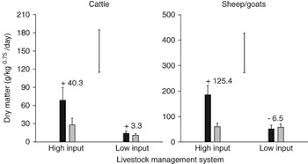
Urban livestock husbandry receives growing attention given the increasing urban demand for livestock products. At the same time,
little is known about the resource use efficiency in urban livestock enterprises and eventual negative externalities. In livestock production, feeds are an important resource whose nutrients are transformed into products (meat and milk) to generate financial return to the producer. The lack of knowledge on nutrient supply through feed might lead to oversupply with severe environmental impacts. In Niamey, a typical West African city and capital of the Republic of Niger, urban livestock production is constrained by feed scarcity, especially during the dry season. Here, the issue of resource use efficiency was studied in 13 representative and differently managed sheep/goat and cattle enterprises characterized by high and low feed inputs, respectively, during a period of 28 months. Nitrogen (N), phosphorus (P) and potassium (K) inflows into each farm through livestock feeds and outflows through
manure were determined using a semi-structured questionnaire; interviews were accompanied by regular weighing of feed supplied and dung produced. Live weight gain (LWG) and efficiency of conversion of total feed dry matter offered (kg TDMO/kg LWG) were computed along with nutrient balances (NBs) per metabolic body mass (kg0.75). NBs (per kg0.75/day) in the high-input (HI) sheep/goat
enterprises were 11762.4 mg N, 1127.2 mg P and 11363.5 mg K and were significantly greater (P , 0.05) than those in low-input
(LI) units (169.1 mg N, 298.3 mg P and 116.5 mg K). In HI cattle enterprises, daily balances averaged 1454.1 mg N, 140.1 mg
P and 1341.8 mg K compared to 134.4 mg N, 29.0 mg P and 168.3 mg K (P . 0.05) in LI cattle systems. All systems were
characterized by poor conversion efficiencies of offered feed, which ranged from 13.5 to 46.1 kg TDMO/kg LWG in cattle and from
15.7 to 43.4 kg TDMO/kg LWG in sheep/goats. LWG in HI sheep/goats was 53 g/day in the rainy season, 86 g/day in the hot dry
season and 104 g/day in the cool dry season, while HI cattle lost 79 g/day in the hot dry season and gained 121 g/day and 92 g/day
in the cool dry and rainy seasons, respectively. The data indicate that there is nutrient wasting and scope for improvement of
feeding strategies in Niamey’s livestock enterprises, which might also decrease nutrient losses to the urban.

Implications
Quantifying the nutrient use efficiency in urban livestock
enterprises is key for balancing nutrients supplied in feeds
to animals’ requirements, leading to improved livestock productivity and consequently economic profitability of such
enterprises. Our results provide strong evidence for inefficient
nutrient use due to poor feeding strategies and inappropriate
dung management in typical West African urban livestock systems. Since such wasting of nitrogen (N), phosphorus (P) and
potassium (K) will lead to N volatilisation and groundwater
pollution by nutrient leaching, environmental safety and human
health might be at risk.
Introduction
In the past 40 years, the urban population of sub-Saharan
West Africa has dramatically risen (Tiffen, 2004), reaching
an average urbanization rate of 36% in 2005 (UN-Habitat,
2007). This has spurred urban demand for food, mainly
for cereals, pulses and livestock products (Tiffen, 2004;
Pistocchini et al., 2009). In the region, urban livestock husbandry has become increasingly widespread as a source of food, income and employment, savings and as an insurance
system (Ferna´ ndez-Rivera et al., 2005; Thys et al., 2005;
Ayantunde et al., 2007). In Bamako, Mali, reportedly over
20 000 households keep livestock under urban conditions
(Schiere and van der Hoek, 2001), while in Ouagadougou,
were livestock keepers; poultry were the
most prevalent (59%), followed by sheep and goats (20%),
pigs (8%) and cattle (7%). Similarly, in Niamey, Niger, 82%
of 130 interviewed households kept animals, while 42%
were involved in gardening and 58% cultivated millet fields
(Graefe et al., 2008). Of the 106 households involved in
animal husbandry, 51% kept cattle, 46% kept sheep, 31%
kept goats and 15% kept donkeys (Graefe et al., 2008).
Sheep and goats were mainly kept in the city centre, while
cattle husbandry dominated at the outskirts. A recent livestock census estimated that Niamey’s livestock population
comprises 36 577 head of cattle, 138 762 sheep and 75 300
goats (Ministe`re des Ressources Animales, 2005). These high
livestock numbers translate into an important demand for
livestock feeds that can not be supplied from the urban area
alone but also relies on the rural surroundings (Guendel,
2002; Graefe et al., 2008).

Material and methods
Study site and household selection
The study was carried out in Niamey, Niger, where the semiarid Sahelian climate is characterized by three distinct seasons. The rainy season lasts from June to October, and the
annual rainfall averages 577 mm (L’Hoˆte et al., 2002). In the
cool dry season (November to February), average daily
temperatures range from 168C to 328C, while in the hot dry
season (March to May) they vary from 278C to 418C. Urban
and peri-urban agricultural activities are expanding within
and around Niamey due to increasing urban demand for plant
and livestock products (Belli et al., 2008; Graefe et al., 2008).
Comprehensive nutrient management monitoring was
conducted in 13 representative and differently managed
livestock keeping households selected from 130 households
characterised in a preceding study (Graefe et al., 2008).
These households were surveyed during a period of 28
months (November 2005 to January 2008) to collect data on
the different inputs and outputs in their livestock units.
To determine the impact of management on nutrient use
efficiency, households were classified as high- and low-input
farms (HI and LI, respectively) based on the amount of total
feed dry matter offered (TDMO) daily to the animals at the
homestead. The average stock number per house from 1 to 10 in Zebu cattle and from 4 to 37 in sheep/goats,
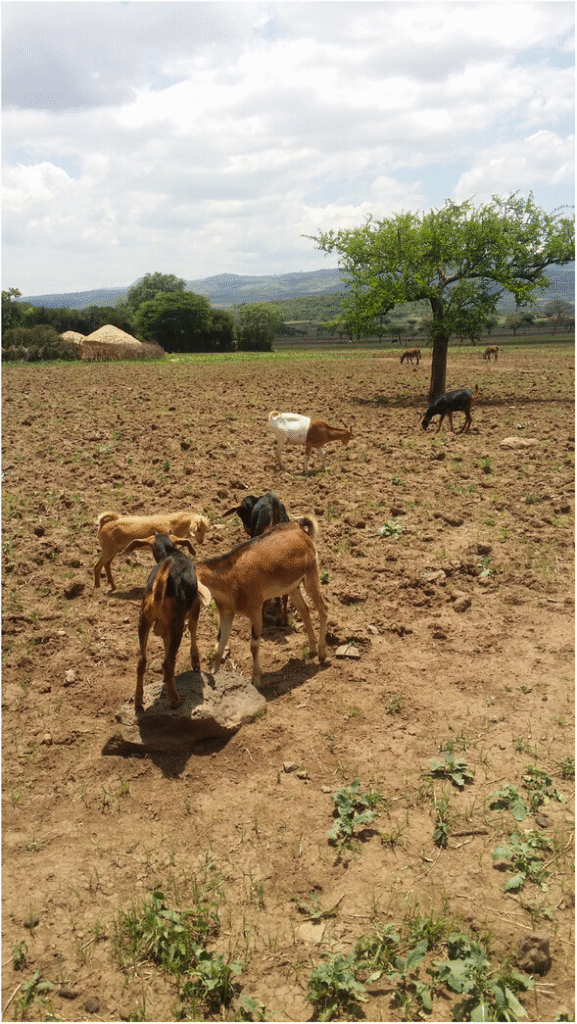
Urban goat farming
whereby more ruminant livestock were kept in LI than in HI
enterprises (Table 1). Four out of the thirteen households
combined indoor HI sheep/goat rearing (plus very sporadic
grazing) with grazing plus stall feeding of LI cattle; four
households managed LI cattle as well as LI sheep/goats; one
and two households only kept cattle and sheep/goats,
respectively, combining HI stall feeding with grazing, and
another two households combined HI cattle rearing (stall
feeding plus grazing) with LI sheep/goat management.
Forage supply and quality assessment
Every 4 to 6 weeks, the origin, type and quantity of feeds
supplied at the homestead and the frequency of feeding
(sometimes feeds were only offered every second day) were
assessed in each of the 13 households by semi-structured
interviews, accompanied by quantitative weigh.
roughages (R; crop residues and collected grasses) and some
non-roughage supplements (NRSs), including brans or grains
of millet, sorghum, maize, rice and wheat, as well as cottonseed cake. Feed samples (two per type of feed) were
collected in each household every 6 weeks and were pooled
per season and type of feed. Samples were analysed for their
concentrations of dry matter (DM), organic matter (OM), N, P
and K, digestible OM (DOM) and metabolizable energy (ME)
using standard procedures (see below). The feed intake
occurring during pasturing was not measured and thus not
accounted for in the calculations of seasonal nutrient flows
and nutrient balances.
Qualitative analyses
feed and manure samples.
For chemical analyses all feed and dung samples were
dried to constant weight at 658C and ground to pass a 1-mm
screen. DM concentration was determined by drying 5 g
of air-dried sample material at 1058C for 5 h, and OM concentration was derived by subsequent ashing of the sample
at 5508C for 4 h (Naumann et al., 2004). Total P was determined colorimetrically (Hitachi U-2000 spectrophotometer,
Schwa¨ bisch Gmu¨ nd, Germany) according to the vanadomolybdate method (Gericke and Kurmies, 1952) and total K was
determined by flame emission photometry (Auto Cal 743,
Diamond Diagnostics, Holliston, MA, USA). Total N was
determined with an N-analyzer (Leco FP-328, Leco Corp.
St Joseph, MI, USA) based on the thermal conductivity cell
measurement.
Statistical analysis
Residuals of all data were tested for normal distribution and
homogeneity of variances before F-tests were performed
using the general linear models (GLM) procedure of SAS 9.1
(Statistical Analysis Systems Institute, 2003). Independent
variables were feeding intensity, season and year, while
dependent variables comprised inputs and outputs of DM, N,
P and K, as well as LW changes of animals. Correlation
between herd size and amount of feed offered was tested
using Spearman’s rank correlation coefficient. Means were
separated by t-tests (LSD) at P 5 0.05.
TDMO/kg LWG obtained in HI sheep/goats compares well to
the 7 to 8 kg DM/kg LWG reported by Bourzat et al. (1987)
for intensively fed Mossi sheep in Burkina Faso. Likewise, in
HI and LI cattle, the obtained cool dry and hot dry season
values of 5.6 to 13.5 kg TDMO/kg LWG agree with the 9.8 to
14.9 kg DM/kg LWG reported for suckler cows in intensive
stall-feeding system in Germany (Schellberg et al., 2006).
Furthermore, they compare well to the 8.9 to 12.7 kg DM/kg
LWG obtained in stall-fed Malawi Zebu (Munthali, 1986).
Apart from these specific cases, the predominantly poor
OFCR obtained across feeding intensities and species in
our study point to large inefficiencies within the systems.

Today, appropriate nutrient management is of major concern in the highly professional production systems of Europe.
and America, due to high N surpluses originating from an
oversupply of high-quality feeds (Kyllingsbæk and Hansen,
2007; Arriaga et al., 2009). In the case of Niamey’s ULP
systems, the slightly to strongly positive NBs also point to
considerable surpluses of inputs at both feeding intensities,
whereby more nutrients were wasted in small ruminant than
in cattle units. This is explained by the high amounts of
protein and energy feeds offered to fattening small ruminants. The N balance obtained in HI cattle (1454.1 mg N/
kg0.75/day) is much lower than that obtained for sheep/goats,
(11762.4 mg N/kg0.75/day), but is higher than the 270.4 mg
N/kg0.75/day calculated for Friesian–Ayrshire steers in
smallholder farming systems in the central highlands of
Kenya (Delve et al., 2001). These nutrient surpluses could be
reduced through a better feeding strategy: by partitioning
the total amount of feed offered into two to three portions
per day to reduce spillage (Jonker et al., 2002; Rotz, 2004),
by grouping animals according to age/weight and physiological status (St-Pierre and Thraen, 1999) and by adjusting the
daily supply of protein and energy to the animals’ requirements. Adjusting the offer of crude protein to animals’
requirements was reported to substantially improve N utilization efficiency of lactating dairy cattle in the Basque
Country, Spain (Arriaga et al., 2009). Furthermore, feeding
diets with high amounts of protein-binding tannins to minimize N excretion via urine and thus NH3 volatilization can
effectively reduce N losses (Satter et al., 2002). However, dung is usually piling up in the
courtyard without any cover and exposed to high temperatures during the hot dry season and to rainfall during the
wet season. This management practice leads to substantial
N losses through denitrification and NH3 volatilization
(Predotova et al., 2009) especially if the manure was to be
utilized in farmers’ home gardens and/or millet fields. Improved
manure handling and storage by covering the dung heap.
with branches or plastic sheets could reduce nutrient losses
(Rufino et al., 2007) in urban livestock production systems
and thus reduce negative environmental externalities of such
enterprises. Given that our study only determined the
amount and quality of dung piling up uncovered in the
courtyard, the monthly measuring interval has certainly lead
to an underestimation of the nutrient excretion by livestock
due to gaseous and eventual leaching losses occurring
between excreta deposit and dung measurement. From a
dung storage experiment in urban gardens of Niamey,
Predotova et al. (2009) reported gaseous N-losses to be
highest during the hot dry season, which amounted to it.
Conclusions
The present results indicated that urban livestock enterprises
in Niamey are characterised by an oversupply of nutrients to
cattle and sheep/goats, which is due to poor feeding management and results in inefficient nutrient use. This might be financially disadvantageous for the farmers, especially in
periods of feed scarcity (rainy and hot dry seasons). The
low growth performance of small ruminants and cattle and
the quasi-absent milk extraction underline the need for
improved feeding management in West Africa’s urban livestock husbandry systems, which must be based on the nutrient requirements of specific age/weight and production
groups. For animals that are grazing at the city fringes during
daytime, a reduction of the amount of feed offered at the
homestead, especially during periods of high feed availability on pastures (cool dry season) is recommended. By doing so, more feed nutrients should be converted into LWG
and milk, and fewer nutrients will be diverted to the dung
heap, be it by excretion or by feed spillage and conversion
into litter. Since most of the presently observed oversupply of
feed N, P and K ends up in the dung heap, there is substantial
risk for environmental pollution, and livestock farmers
should therefore also improve manure handling and storage.

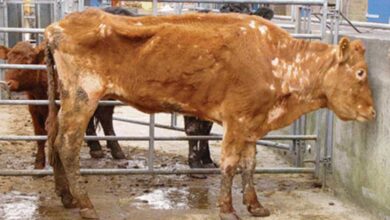
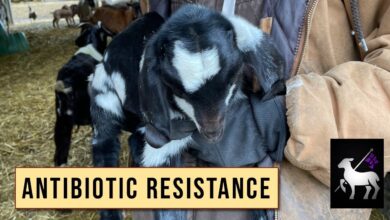
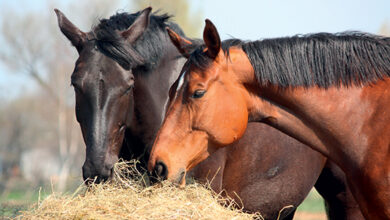
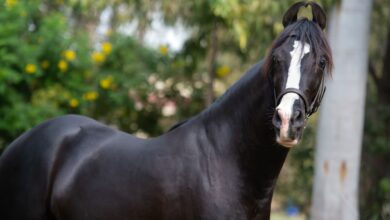
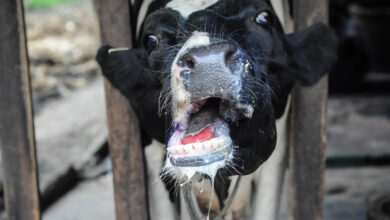
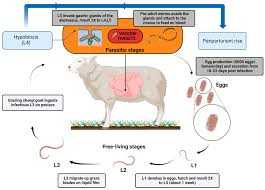
Howdy! veterinaryhub.info
You can send business proposals without risk and in accordance with legal standards, guaranteeing message reception.
This method adheres to legal data privacy standards, ensuring legitimate and transparent outreach.
Sending via Contact Forms helps avoid spam filters compared to traditional email marketing.
Enjoy a free trial and discover its potential.
Rely on our service to transmit up to 50,000 messages efficiently.
The cost of sending one million messages is $59.
This letter is automatically generated.
Contact us.
Telegram – https://t.me/FeedbackFormEU
WhatsApp – +375259112693
WhatsApp https://wa.me/+375259112693
We only use chat for communication.
Hello,
This is Mike from Monkey Digital,
I am contacting you regarding a great business deal.
How would you like to show our promotions on your website and link back via your unique affiliate link towards high-demand products from our platform?
This way, you receive a solid 35% residual income, month after month from any sales that generate from your site.
Think about it, all businesses benefit from SEO, so this is a massive opportunity.
We already have 12k+ affiliates and our commissions are processed every month.
Last month, we distributed over $27,000 in affiliate earnings to our affiliates.
If this sounds good, kindly contact us here:
https://monkeydigital.co/affiliates-whatsapp/
Or register today:
https://www.monkeydigital.co/join-our-affiliate-program/
Best Regards,
Mike Helmut Smit
Phone/whatsapp: +1 (775) 314-7914
Hi,
I recognize that most website owners struggle grasping that SEO is a gradual process and a carefully organized monthly initiative.
Unfortunately, very few website owners have the patience to recognize the progressive yet significant results that can completely change their online presence.
With constant algorithm changes, a reliable, long-term strategy including Answer Engine Optimization (AEO) is critical for achieving a profitable outcome.
If you recognize this as the ideal strategy, partner with us!
Explore Our Monthly SEO Services https://www.digital-x-press.com/unbeatable-seo/
Reach Out on Instant Messaging https://www.digital-x-press.com/whatsapp-us/
We provide remarkable performance for your investment, and you will enjoy choosing us as your SEO partner.
Best regards,
Digital X SEO Experts
Phone/WhatsApp: +1 (844) 754-1148